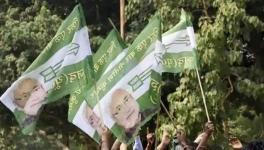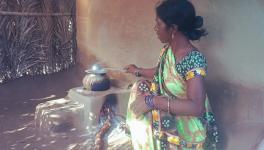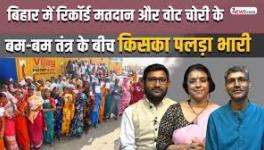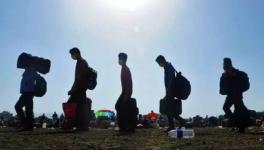Lockdown in Rural Bihar: Social Rift Works, But Not Distancing
Women queuing up to get their rations in Basaitha village.
In Turkaulia village in Muzaffarpur district of Bihar, a series of bizarre and tragic events have taken place in two weeks of the national lockdown. These have turned people paranoid of outsiders, even of their coughs and sneezes. They know they are required to maintain social distance, but do not quite know what the term implies, as they descend on the vegetable marts and get lathi-charged by the police.
This is not what life was like in these parts of Bihar. But, then came COVID-19 and the lockdown, and stories on TV about the Tablighi Jamaat’s role in spreading the deadly virus. For many of them, therefore, the face of the novel coronavirus is the Muslim.
Since few have masks and sanitisers, their only form of protection against the virus is neurotic suspicion. When anyone is heard coughing, sneezing or appearing sick with a fever, the villagers start calling their mukhiya or other officials to warn them of “coronavirus-infected patients”. The mukhiya does not quite know what to do, in the absence of medical service.
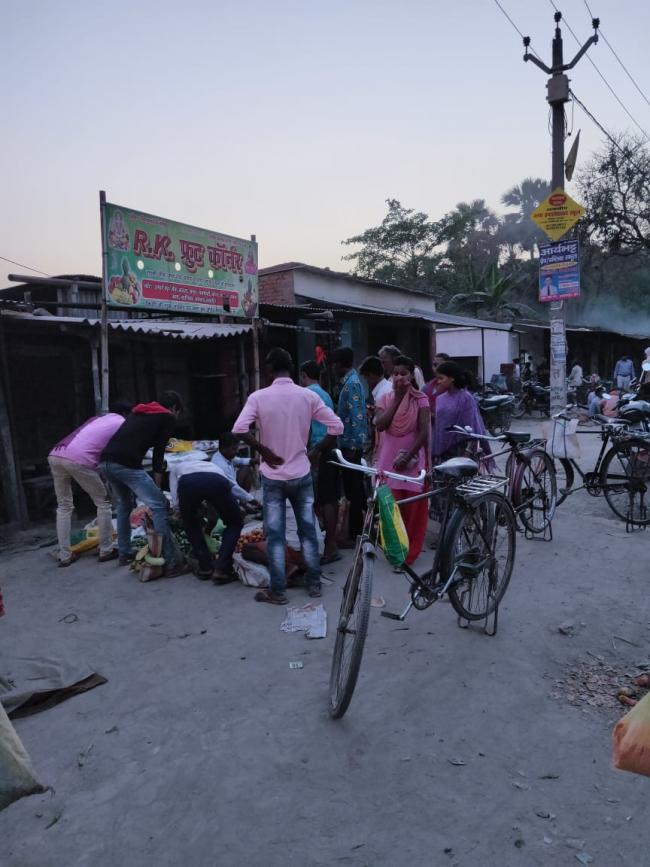
Photo from Basaitha village on 8 April, where a weekly Haat was held.
It is that time of the year when cold and fever strike many. But, these are, in the days of coronavirus, incriminating evidence which must be suppressed. So, they make a beeline for medical stores. Cough syrups and paracetamol are selling like never before.
Life turned chaotic in Turkaulia when around 250 migrant workers wended their way from cities to this village, which is really a cluster of three panchayats in Muzaffarpur. It was assumed that these men have brought the dreaded virus with them. “There are no confirmed cases of COVID-19 in my panchayat,” says Asghar Ali, a member of the Kamalpura panchayat committee, in which a part of Turkaulia falls. “But that’s because hardly any migrant has been tested for Corona. When there has been no testing, how do we know who is sick and who is not,” he adds.
It sounds like a line from innumerable talk shows on COVID-19. Even the Central government suspects, it is said here, that one-third of migrants who fled cities could have been carriers of the virus.
“We just want to be relieved of the stress of not knowing,” says Chitanand Dwivedi, the mukhiya of the Datapur panchayat samiti, which falls just north of Turkaulia. “If someone tests positive the government should treat them, and if they test negative then all would be well,” he says. Because the migrants have not been tested, people fear a terrible future awaits them. “This uncertainty is a hundred times worse than the lockdown,” Dwivedi says.
Straining under the burden of checking the coronavirus from spreading, Dwivedi directs his rage against the outsiders or migrants. “Those who have come from outside should stay far away from even their own families, but many are violating social distancing,” says Dwivedi.
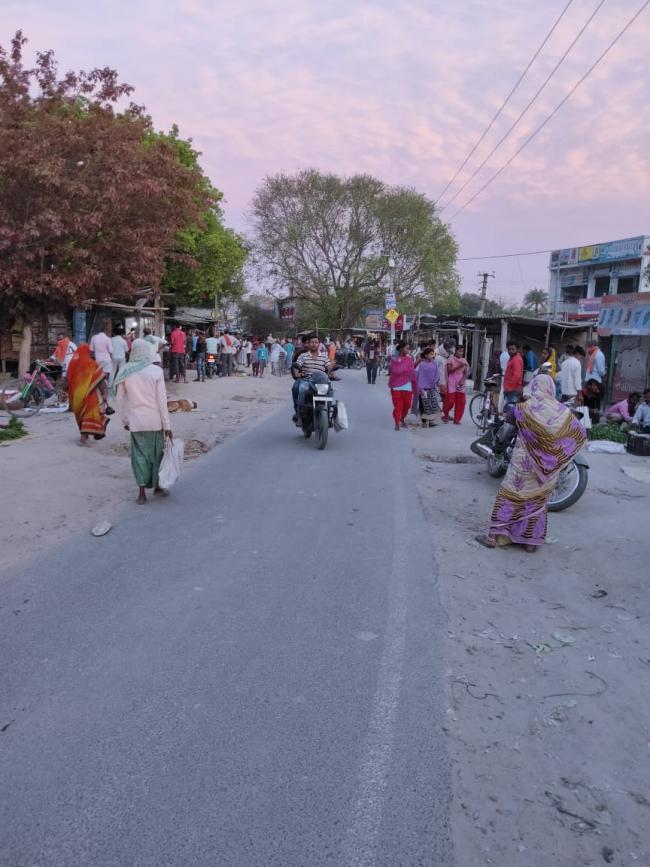
Photo from Basaitha village on 8 April, where a weekly Haat was held.
The mukhiyas of neighbouring panchayats have been “miking” – moving around with loudspeakers and disseminating information about hand-washing, how people should sneeze into handkerchiefs and not crowd around.
Dwivedi declares, “I am roaming around with my life in the palm of my hand. We have a small health centre but it does not have a doctor. They did appoint a doctor actually, but can anybody force them to come to work?” The mukhiya does not possess a mask, but uses his gamcha to cover his face.
Like a soldier gallantly protecting the border, he declares: “If I succumb to fear, there will be chaos.
But there is chaos already, except that the state government and the Centre haven’t acknowledged it yet. For instance, a migrant worker returned to Datapur from Gujarat on March 28. He locked himself indoors with his family of six. Alarmed, the neighbours repeatedly knocked at his door, but none of the six responded. The neighbours reported to Dwivedi about a possible COVID-19 patient in their midst.
For two days, Dwivedi dialled every district and state official he could think of, but no help came. He then recorded a video SOS message that he circulated online. Sure enough, it caught the media’s attention.
A medical team comprising a doctor, a compounder and a driver trundled up to the village in an ambulance and entreated the young migrant to step out. As the man stepped outside, Dwivedi and the team glared at him. It was obvious he was ill. That was the only “medical” exam he got. For, the medical team neither had a test kit, nor protective gear. ‘We can only help the public if we don’t fall sick ourselves,’ the doctor told Dwivedi.
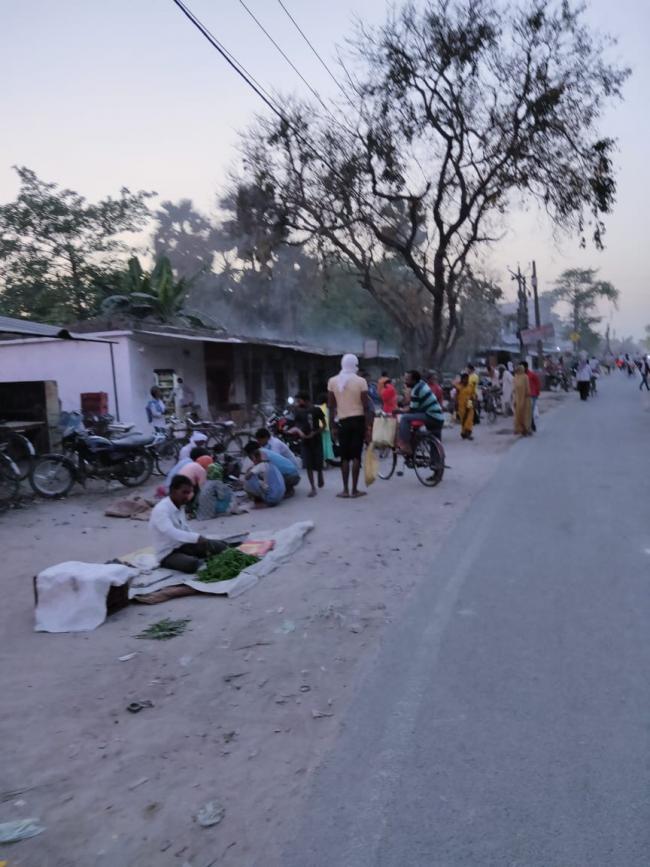
Photo from Basaitha village on 8 April, where a weekly Haat was held.
The man was not whisked away, as he should have been. The team gave him some medicines and asked him to stay indoors. And though Dwivedi admits that the migrant had looked “more terrified than unwell” on the day the medical team came, it is back to square one as far as he is concerned. He, after all, still has to keep reassuring the paranoid village until the sick man recovers.
District officials, mukhiyas and panchayat members have held video-conferences with the Chief Minister to discuss the facilities Bihar’s villages will get to deal with the crisis. “Unless every panchayat gets Rs 10 lakh, nobody can defeat coronavirus,” says Dwivedi, his voice panicky. “We still have at least 50 bahar walas—‘outsiders’—right now, and no test kits,” Dwivedi says.
Even in nearby Kamalpura, the returning migrants roam around, sip tea at stalls, chat at chaupals and exchange videos about the Tablighi Jamaat in which Muslims are blamed for India’s coronavirus epidemic. “Corona has become a Hindu-Muslim issue and the divide between communities has become very wide,” says Asghar Ali. “There’s nothing we can seem to do to stop it.”
After Modi’s 9 p.m. speech on April 3, Naheed, a bank employee at Kamalpura, a part of Turkaulia in the Saraiya block of Muzaffarpur, received a call from a friend who said, “Aap log galat kaam kiye—you people have done something wrong, you all were hiding in the mosque.” Naheed points to an inherent bias in the village and the media’s narrative: “Muslims were ‘hiding’ in the Tablighi Jamaat mosque, but Hindus were ‘stuck’ at Vaishno Devi. Is Kanika Kapoor [the singer who tested positive for coronavirus] a Tablighi member?”
But even Dwivedi seems to have been bitten by the blame-the-Muslims bug. He says he is seeking government assistance for every member of his panchayat regardless of their caste or community identity, but, in the same breath, dubs the Jamaat’s members “terrorists”.
On April 7, fourteen days into the lockdown, villagers turned up in huge numbers to shop for vegetables at the local haat that is set up along a rather narrow street at Basantpur Patti village, also in Saraiya block. Almost nobody wore masks, nor did they stand at a distance of six feet from each other. They bumped into each other, and bargained with the sellers at close distance.
Social distancing is easier to maintain in gated colonies of urban sprawls. Staying at home is hard for anyone having to struggle for at least a meal day. “We need rations,” says Lalan Kumar, the mukhiya of Kamalpura, a part of Turkaulia in the Paroo block of Muzaffarpur. Kumar has turned a school into an isolation centre for housing a “Corona Group” of ten to twelve migrant workers. “We’re doing our best to do social distancing and people are listening to us. But, at least 1,000 of the very poor do not have rations and need help,” he says. This is something on which all mukhiyas and residents agree—that the poor in their panchayats are growing desperate for essentials, especially those who worked and earned on a daily basis.
Social distancing suffered a setback when the government transferred Rs 500 into Jan Dhan bank accounts last week. “Earlier, some 20 people would visit the bank daily to check if their money had arrived. Now, thrice as many come daily to withdraw money,” says Naheed. Attempts to persuade villagers to stand at a distance from each other have failed.
The bank has asked its staff to use masks and sanitisers, for which they will be reimbursed Rs 1,500 each. “When there are no masks available here, where do we get them from?” he asks. He runs through a 750-ml bottle of Dettol hand-wash every four days as he gets customers to wash their hands with it for the prescribed 20 seconds. Besides, not all in Turkaulia can afford a 150-ml bottle of sanitiser, even if it sells for the reduced price of Rs 150.
Sonu is among those in Madhaul, also in the Saraiya block of Muzaffarpur, who refrains from stepping outside his house, which is located across the street from a medical store. “I see people throng the store by the hundreds. The store-keeper rolls down the shutter to disperse the crowd sometimes, but when he re-opens in half an hour, they’re all back there, jostling to get ahead,” Sonu says.
Since the lockdown began, the demand for medicines at the medical store has outstripped supply. For at least eight hours a day, there’s a crush of people there, purchasing over-the-counter drugs to combat symptoms they think resemble those due to COVID-19.
Naheed laughs and says, “If anybody shows up at that medical store with fever, the owner makes him stand away from the crowd. Then he peers at the customer intently. It’s just seasonal flu, the customer declares. But everybody, including the chemist, suspects that its the dreaded Corona,” he says.
The drama at the medical stores terrifies Sonu. He wishes the police would lathi-charge the crowd. “The police need to get off the main roads and patrol inside the villages. People are not following social distancing!” Sonu says.
The trigger for the chaos in this village is, ironically, the lockdown itself. To obey the government’s sudden directive to lockdown, people have had to wind up operations. For instance, the kirana stores are closed in many parts of this area, except a couple, and the vegetable market has been pared down to a third of its size. As a result, the availability of essential items—food, vegetables, medicines, etc—has declined, but the number of consumers remains the same.
“That is why log toot padtey hain—they pounce on whatever supplies are available,” says Ali, the panchayat member. “As a result, social distancing toh hai hi nahi—there’s no distancing left to speak of.” Adds Dwivedi, with a touch of desperation, “There is no milk, no medicine, no ration, no gas, no money in bank accounts. The dehat always lacked the services provided by the administration, doctors, nurses, police…Now we only appeal to government to bring food supplies—and test kits,” he says.
In short, nobody really knows how to tackle the novel coronavirus. In their fear, people have found someone to blame for the virus—the Muslims.
Get the latest reports & analysis with people's perspective on Protests, movements & deep analytical videos, discussions of the current affairs in your Telegram app. Subscribe to NewsClick's Telegram channel & get Real-Time updates on stories, as they get published on our website.












